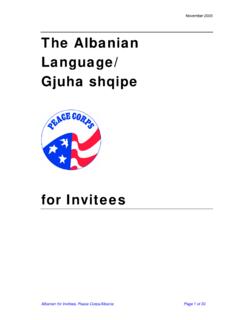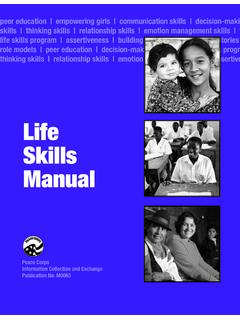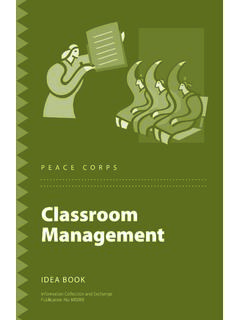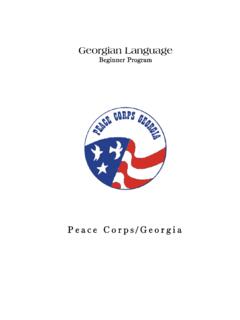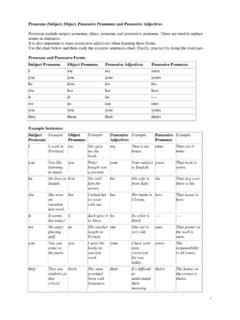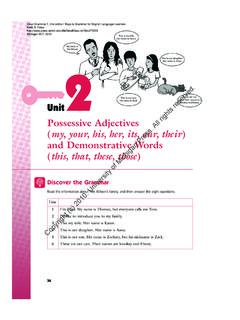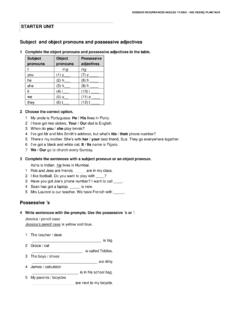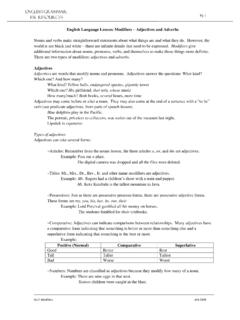Transcription of Basic Introduction to Arabic - Peace Corps
1 Basic Introduction to Arabic Introduction : This is an extract from the Moroccan Arabic book. You will notice that we did not follow the book page by page. We rather picked some key elements in the book that a beginner can do on his/her own. Page numbers refer to the complete book not this PDF guide. The Arabic readings in these lessons are done by our Language and Culture Facilitators. Table of Contents Lesson number Title Page Lesson 1 Arabic Alphabet 1 Lesson 2 Greeting Expressions 5 Lesson 3 Greetings Dialogue 6 Lesson 4
2 Independent pronouns 7 Lesson 5 possessive pronouns 8 Lesson 6 Describing Oneself 10 Lesson 7 Describing Oneself (practice dialogue) 11 Lesson 8 Demonstrative pronouns / adjectives 14 Lesson 9 Mealtime Expressions 19 Lesson 10 Thanking Expressions 19 Lesson 11 Expressions for nighttime 20 Lesson 12
3 Hygiene 20 Lesson 13 Offering Help 20 Lesson 14 Being sick 21 Lesson 15 Transportation Expressions 21 Lesson 16 Responding to difficulties/Apologies 21 Lesson 17 Congratulations 21 Lesson 18 Communication 21 Lesson 19 Numerals 22 Lesson 20 Numerals 24 Lesson 21
4 Numerals 25 Lesson 22 Time 30 Lesson 23 Exercises about Time 31 Lesson 24 Shopping 34 Lesson 25 Shopping Expressions 34/35 Lesson 26 Practice Dialogue/Shopping 35 Lesson 27 Verb to want 36 Lesson 28 Family Members 38/39 Lesson 29 Family Expressions 39 Lesson 30 Family practice text
5 41 The text accompanies the following ten (10) audio tracks: (Time: 4:05) (File Size: MB) (Time: 3:32) (File Size: MB) (Time: 3:42) (File Size: MB) (Time: 2:20) (File Size: MB) (Time: 1:28) (File Size: MB) (Time: 1:13) (File Size: MB) (Time: 2:19) (File Size: MB) (Time: 5:10) (File Size: MB) (Time: 3:17) (File Size: MB) (Time: 4:25) (File Size: MB) Peace Corps / Morocco Arabic Basic Lessons, Peace Corps /Morocco 2 Page 1 Lesson 1 Arabic Alphabet Peace Corps / Morocco Arabic Basic Lessons, Peace Corps /Morocco 3 Page 5 Lesson 2 Greeting expressions and appropriate responses A: Peace be upon you B: And Peace be upon you (too) s-salamu alaykum wa alaykum s-salam A: Good morning B: Good morning s baн l-xir s baн l-xir A: Good afternoon / evening B: Good afternoon / evening msa l-xir msa l-xir name smiya What s your name?
6 Nu smitk? my ..your ..his ..her ..Nice to meet you. mt rfin How are you (masc.)? kif dayr? How are you (fem.)? kif dayra? Are you fine? labas? Good, thanks be to God. labas, l-нamdullah Good, thanks be to God. bixir, l-нamdullah Everything is fine. kul i bixir Good-bye bslama Good night layla sa ida Peace Corps / Morocco Arabic Basic Lessons, Peace Corps /Morocco 4 Page 6 Lesson 3 Greetings Dialogue John:s-salamu alaykum. : Mohamed:wa alaykum s-salam. : John:kif dayr? : Mohamed:labas, l-нamdullah. u nta? . : John:bixir, l-нamdullah. : Mohamed: nu smitk? : John:smiti John. u nta? . : Mohamed:smiti Mohamed.
7 : John:mt rfin. : Mohamed:mt rfin. : Peace Corps / Morocco Arabic Basic Lessons, Peace Corps /Morocco 5 Page7 Lesson 4 Independent pronouns We call the following pronouns independent because they are not attached to other words, such as nouns, verbs, or prepositions. The pronouns are often used in a number of different ways. I ana you (masc. singular) nta you (fem. singular) nti he huwa she hiya we нna you (plural) ntuma they huma Peace Corps / Morocco Arabic Basic Lessons, Peace Corps /Morocco 6 Page 8 Lesson 5 possessive pronouns In Darija, a suffix (ending) may be added to the end of words in order to express possession. my i / ya *T / your (singular) k his u / h *T / her ha our na your (plural) kum their hum * For the my and his forms, the first ending is used for words ending in consonants, while the second is used with words ending in vowels.
8 For example, smiti (my name), but xuya (my brother). Example of possessive pronouns with the noun book. book ktab my book ktabi your (sing.) book ktabk his book ktabu her book ktabha our book ktabna your (plur.) book ktabkum their book ktabhum Peace Corps / Morocco Arabic Basic Lessons, Peace Corps /Morocco 7 Page 10 Lesson 6 Describing Oneself: Nationalities, Cities, and Marital Status Vocabulary and Expressions Where are you (masc.) from? mnin nta? Where are you (fem.) from? mnin nti? I am from the ana mn mirikan.. I am American. ana mirikani(ya). ) .(I am from Morocco. ana mn l-m rib..I am Moroccan. ana m ribi(ya). ) .(Are you .. ? we nta/nti .. ? / .. Are you from the we nta/nti mn mirikan? / Where are you from in the mnin nta/nti f mirikan?
9 / And you? u nta/nti? / city mdina state wilaya big (fem.) kbira small (fem.) s ira Excuse me. (to man / woman) smн li / smнi li / I am not .. ana ma i ..but welakin engaged (fem.) mxt uba married (masc. / fem.) mzuwj / mzuwja / No, not yet. lla mazal / lla baqi / Are you a tourist? we nta/nti turist? / I work with the Peace Corps . ana xddam(a) m a hay'at s-salam. ) ( . Peace Corps / Morocco Arabic Basic Lessons, Peace Corps /Morocco 8 Page 11 Lesson 7 Dialogue Fatima: s-salamu alaykum. : Tom: wa alaykum s-salam. : Fatima: smн li, we nta fransawi? : Tom: lla, ana mirikani.. : Fatima: mnin f mirikan? : Tom: mn mdint Seattle f wilayat Washington.
10 U nti? . : Fatima: mn Rabat.. : Tom: нal f mrk? : Fatima: tnayn u rin am. u nta? . : Tom: rb a u tlatin am.. : Fatima: we nta mzuwj wlla mazal? : Tom: mazal. u nti? . : Fatima: lla, baqiya. we nta turist? . : Tom: lla, ana xddam m a hay'at s-salam.. : Fatima: bslama.. : Tom: n- ufk mn b d.. : Peace Corps / Morocco Arabic Basic Lessons, Peace Corps /Morocco 9 Page 14 Lesson 8 Demonstrative adjectives & Demonstrative pronouns Demonstrative pronouns this (masc.) hada this (fem.) hadi these (plur.) hadu that (masc.) hadak that (fem.) hadik those (plur.) haduk These forms may be used at the beginning of a sentence, in the middle or at the end of a sentence, or in questions.

